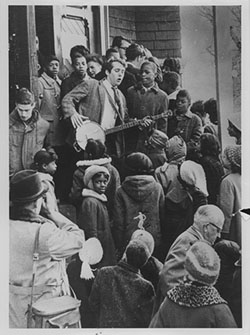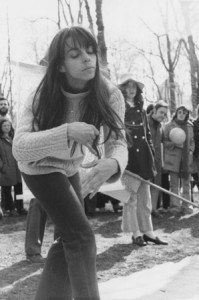 The following is a series written by archivists, academics, activists, and educators making available primary source material, providing pedagogical support, and furthering the understanding of Boston Public School’s Desegregation history.
View all posts
The following is a series written by archivists, academics, activists, and educators making available primary source material, providing pedagogical support, and furthering the understanding of Boston Public School’s Desegregation history.
View all posts
The 2014-2015 school year marked the 40
th anniversary of Boston Public School (BPS)’s court-ordered school desegregation. To commemorate this event, BPS is building a multi-grade curricular unit for students to study the city’s school desegregation and “busing” crisis. Before this unit was created, students learned about integration efforts only through the case study of Little Rock, AK. Neglecting to address, understand, and own Boston’s own civil rights struggles perpetuates the notion that the Civil Rights Movement targeted injustice and segregation only in the South, when in truth, Boston’s struggles were equally important and difficult.
To assist this effort, Northeastern’s University Archives and Special Collections is coordinating a multi-archive scanning project whose goal is to make available archival material that relates to what how and why busing happened in Boston, as well as the after effects it had on the community. The goal is to create a digital library of material that can be widely disseminated for both curricular and scholarly use.
This effort has been made possible by a gift from the
Boston Library Consortium (BLC), whose leadership has been essential to this project.
This School Desegregation and ”Busing” Digital Library is a lightweight, nimble project that attempts to lay the technical and descriptive groundwork for cross-institutional collaboration through the technical infrastructure of the
DPLA and
Digital Commonwealth. It also serves as the kernel of what all hope becomes a long-standing collaboration between BPS and local archives. In an ideal world, all 57,000 BPS students visit an archive during their K-12 years. Realistically, digitizing this material allows teachers unfettered access to a deep pool of primary source material which can inspire students to learn more about the history of their own city and become emerging leaders.
The BLC members initiating this effort are University Archives and Special Collections at UMass Boston, the Northeastern University Archives and Special Collections, The State Library of Massachusetts’ Special Collections, and Boston College’s John J. Burns Library of Rare Books and Special Collections. Additional archival partners include The Moakley Archive and Institute at Suffolk University and the Boston City Archives.
Partner institutions are scanning material that illuminate the complexity of state- and city-wide politics, community activism and advocacy, and all parties’ reactions to national and local legislation. The time frame covered originates with the Brown v. Board of Education decision (1954), works through the Civil Rights Act (1964), into and past the Morgan v. Hennigan case (1974), and the resulting citywide unrest. The collection aims to illustrate the reaction of politicians, school staff and administrators, parents and community members to desegregation by busing.
To watch the growing collection of items that is Northeastern’s contribution to this effort, please visit the University’s
Digital Repository.
— Giordana Mecagni is Head of Special Collections and University Archivist at Northeastern University



